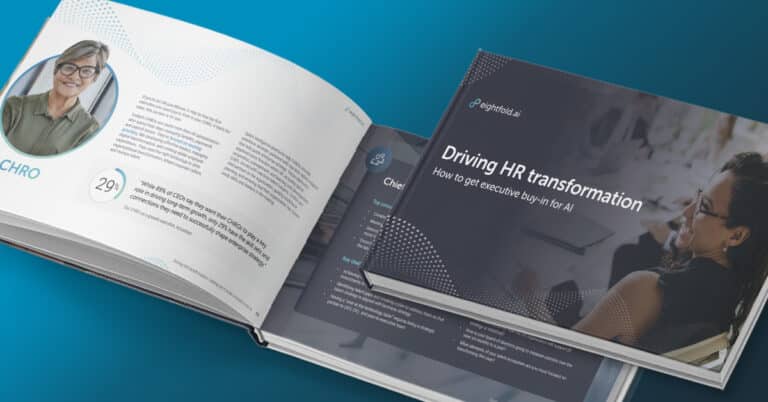Today, one of the biggest drivers of change — and new opportunities — is AI.
For HR, the value is clear. Talent intelligence platforms can distill insights and patterns from billions of global data points to help organizations enhance the entire talent life cycle. That includes sourcing, matching, interviewing, retention, internal mobility, mentoring, promotions, and succession planning. Talent intelligence platforms can also streamline time-consuming tasks, like parsing through résumés and scheduling interviews, saving hours each week.
But what about the rest of the organization — especially the C-suite? Why should they care about talent intelligence, especially with the rise of generative AI and all the other departments itching for new AI capabilities? Here’s why every executive needs to be concerned with talent intelligence in the HR tech stack.
Key takeaways include:
- Why talent intelligence gives you a strategic advantage in workforce planning
- How talent intelligence can increase retention of top talent, while reducing costs
- How talent intelligence can give you a competitive advantage, especially when it comes to adopting new technologies and finding employees with the skills to use them
There was a last-minute opening on your leader’s calendar. Your meeting starts in 14 minutes. Finally — this is your chance to talk to them about talent intelligence.
Three minutes before the call, your mind is swirling with all the ways talent intelligence could benefit your department and organization. You could start hiring for potential by inferring skills adjacencies.
You could use real-time data on rising and falling skills to bridge skill gaps and make strategic, costeffective plans to build, buy, or borrow the right talent. Better yet, you could free up your team’s time to focus on higher-value activities, reduce bias throughout the talent life cycle, and deliver a world-class employee experience.
You hop on the call, eager for next steps, and the first thing they say is: “We’re paying a lot of money for your existing HR tech stack, and we just upgraded your ATS in May. Why do you need this solution? Besides, I’ve never heard of talent intelligence.”
You freeze. You know exactly why your organization needs talent intelligence. AI is transforming every industry — especially HR — and the rate of digital and industrial change is only increasing. Additionally, HR has evolved from being focused on processes and paperwork to being strategic advisers to the business. Every new hire comes through HR, and AI is essential to fuel and accelerate all your organization’s strategic work.
But how do you articulate all that in a way that resonates with key decision-makers?
Whether you’re an HR leader trying to get your executives on board for talent intelligence or you’re in the C-suite and wondering how talent intelligence can help you, this guide is for you.
The undeniable case for talent intelligence
“Evolve or die” was the prevailing sentiment from PwC’s 2023 survey of over 4,410 CEOs. “Transform or perish,” echoed The Josh Bersin Company in its 2023 pacesetters report that analyzed common patterns in top-performing companies.
Unrelenting changes in the economy, technology, society, and the climate have created a state of flux and compulsory adaptation for organizations. One of the biggest drivers of this change — and new opportunities — is AI.
According to our Talent Survey, 92% of HR leaders planned on increasing their use of AI in at least one area of HR in 2023. And it’s not just HR leaders who are eager to take advantage of this technology. According to Deloitte, 94% of business leaders said they believe AI is critical to success.
For HR, the value is clear. Talent intelligence platforms can distill insights and patterns from billions of global data points to help organizations enhance the entire talent life cycle. That includes sourcing, matching, interviewing, retention, internal mobility, mentoring, promotions, and succession planning. Talent intelligence platforms can also streamline time-consuming tasks, like parsing through résumés and scheduling interviews, saving hours each week.
But what about the rest of the organization — what about the C-suite? Why should they care about talent intelligence, especially with the rise of generative AI and all the other departments itching for new AI capabilities? Here’s why every executive needs to be concerned with talent intelligence.











